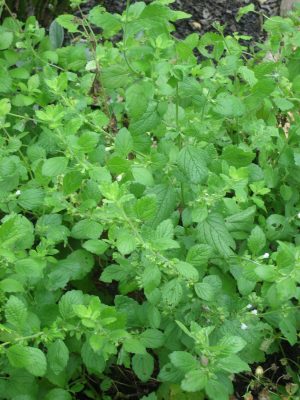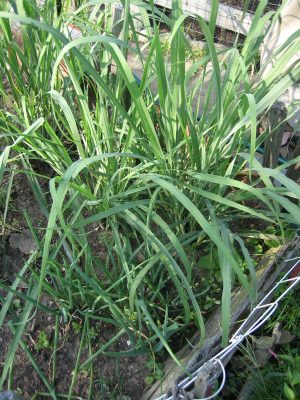By Dawn Pettinelli, UConn Home & Garden Education Center
With summer almost around the corner, many of us are setting in vegetables and herbs in hopes of preparing delectable culinary delights as these plants mature. Aromatic herbs bring amazing flavors and zing to all sorts of savory and sweet concoctions. A citrusy taste complements many dishes and some may not be aware of the wealth of lemon-flavored herbs that are widely available and also easy to grow.

Long-lived lemon balm has been a staple in my herb garden for years. The attractive heart-shaped, scalloped leaves have a delicate scent when rubbed. Lemon balm is a hardy perennial native to Europe and has long been grown for its culinary and medicinal purposes. Fresh or dried leaves can be made into a calming tea that reputedly reduces anxiety. They can also be used in savory chicken dishes, to make pesto and even in baked goods. The lemon balm I grow is the species and it produces flowers that, like many members of the mint family, are loved by bees. A dilemma ensues as to whether to leave the blossoms for the pollinators and deal with the copious seedlings that pop up the following year, or cut the plant back to encourage more leaf production. Also, once lemon balm flowers, the leaves take on an unpleasant ‘soapy’ taste. Cultivars such as ‘Compacta’ are sterile, so no seeds are produced.
As long as it is grown in a well-drained soil, lemon thyme is another long-lived herb. Growing just 4 to 6 inches tall, it’s an attractive plant in the herb garden, as an edging plant or even as a front border plant in perennial gardens. There are green, golden, and variegated leaved cultivars. Sprigs of lemon thyme can be dried but I like to use them fresh in chicken or rice dishes. The pinkish flowers usually open in July and are a big pollinator draw. Like many herbs, the best flavor is obtained collected before flowering. Plants respond well to regular trimmings.
Lemon basil is an annual in our climate but easily grown from seed. Like all basils, it does best in a sunny, fertile site with adequate moisture. Plants also do great in containers. Leaves have a fresh lemony scent and taste with some hints of mint and spices. If growing from seed, one might want to try ‘Sweet Dani’, which was a 1998 All America Selection winner. Named cultivars such as ‘Mrs. Burns’ lemon basil usually have larger leaves than the seed grown types. Pinch out flower stalks as they form for better flavor or for a longer and more abundant harvest, cut off the top third of your plants about once a month. This encourages greater branching and leaf production. Lemon basil rice is my favorite way to use fresh leaves.

A tender perennial, lemon verbena, is mostly grown as a container plant and overwintered indoors. Plants have an exceptionally strong lemon scent and if happy, grow quite vigorously. They can easily get 3 or 4 feet tall and will grow into a small tree in warmer climates. Lemon verbena is native to South America, so it enjoys full sun and hot weather. Leaves can be used in potpourris, teas, and sweets.
Another tender perennial best grown in a pot is the lemon scented geranium. There are several named cultivars with some, like ‘Mabel Gray’ and ‘Rober’s Lemon Rose’, having a stronger scent. Either buy plants or start from a friend’s cutting. The lovely scented wavy leaves can be placed in the bottom of a cake or loaf pan and then filled with batter and baked, imparting a lovely pattern and slight lemony flavor. They can be used fresh or dried for a variety of culinary uses and are also good in potpourris.
Those enjoying Asian cooking are likely already familiar with the rich flavor of lemon grass. While it is native to India and only hardy to zone 10 to 12, it is a pretty vigorous grower that would do well in either a garden bed or container. Reportedly plants may reach 2 to 3 feet in height by midsummer if kept well-watered. The leaves as well as the bulbous base of
the stem are used in recipes. A few stalks can be removed as needed for cooking. Cut back potted plants to 6 inches before overwintering in a sunny window indoors.
For more information about growing lemon scented herbs or on other gardening topics, feel free to contact us, toll-free, at the UConn Home & Garden Education Center at (877) 486-6271, visit our website at www.homegarden.cahnr.uconn.edu or contact your local Cooperative Extension Center.